
2009 J. Philip Wogaman
First edition
Westminster John Knox Press
Louisville, Kentucky
09 10 11 12 13 14 15 16 17 1810 9 8 7 6 5 4 3 2 1
All rights reserved. No part of this book may be reproduced or transmitted in any form or by any means, electronic or mechanical, including photocopying, recording, or by any information storage or retrieval system, without permission in writing from the publisher. For information, address Westminster John Knox Press, 100 Witherspoon Street, Louisville, Kentucky 40202-1396. Or contact us online at www.wjkbooks.com.
Scripture quotations from the New Revised Standard Version of the Bible are copyright 1989 by the Division of Christian Education of the National Council of the Churches of Christ in the U.S.A. and are used by permission.
Material herein from Making Moral Decisions by J. Philip Wogaman and published in 1990 by Abingdon Press is used by permission.
Book design by Drew Stevens
Cover design by Mark Abrams
Library of Congress Cataloging-in-Publication Data
Wogaman, J. Philip.
Moral dilemmas : an introduction to Christian ethics / J. Philip Wogaman.1st ed.
p. cm.
Includes index.
ISBN 978-0-664-23316-7 (alk. paper)
1. Christian ethics. I. Title.
BJ1251.W5823 2009
170dc22
2008033220
PRINTED IN THE UNITED STATES OF AMERICA
 The paper used in this publication meets the minimum requirements of the American National Standard for Information SciencesPermanence of Paper for Printed Library Materials, ANSI Z39.48-1992.
The paper used in this publication meets the minimum requirements of the American National Standard for Information SciencesPermanence of Paper for Printed Library Materials, ANSI Z39.48-1992.
Westminster John Knox Press advocates the responsible use of our natural resources. The text paper of this book is made from at least 30% post-consumer waste.
Dedicated with Love to Our Grandchildren
Carolyn Martha Fado
Pinkney Susannah Wiggins
John Philip Wogaman II
Carrie Adelaide Wogaman
Paul Joseph Wogaman Jr.
Emily Margaret Wogaman
Ella Jill Wogaman
Deborah Anneliese Wogaman
Preface
I have written this in response to the need for a shorter and more accessible book on moral decision-making, suitable for study groups of thoughtful laypersons who are not scholars but who still must struggle with hard choices. I have also had in mind the college or seminary ethics classes where different viewpoints are represented by small volumes.
This is not my first book on decision-making. The first, A Christian Method of Moral Judgment, was published in England and the United States in 1976, with a revised second edition, Christian Moral Judgment, appearing in 1989. Most of my other books and shorter writings deal with moral decision-making in one way or another. This shorter book builds upon those earlier contributions and many more years of experience as a scholar and teacher in ethics. Bearing in mind that this book is an invitation to conversation, I have included as an appendix a section titled Avoiding Pitfalls in Moral Argument. These suggestions of what to avoid appear in another of my earlier books, Making Moral Decisions (Nashville: Abingdon Press, 1990), and are used by permission.
I have benefited greatly from the many responses to my earlier work on moral decision-making as well as other books I have written through the years. The late Paul Ramsey once remarked that to be a teacher of ethics is to occupy an academic bench, rather than a chair. He was right. We must deal with a wide spectrum of issues and draw upon many different kinds of expertise. We cannot ourselves be experts on all of this, but we must struggle with the connections to be made between moral norms and values and the different kinds of experts who help us understand the factual world in which we live. We cannot know it allnobody can. But the special responsibility of ethicists is to attend to the connecting points.
While I have gained much from the wisdom of others, I must take full responsibility for what is written here. I trust I will again learn from the criticisms of others, both positive and negative. I am again grateful for the thoughtful suggestions of my wife Carolyn and for the careful editorial work of Stephanie Egnotovich of Westminster John Knox Press.
Introduction
To be human is to face moral decisions. Whether we view such decisions as choosing between right and wrong or as the somewhat different contrast between good and evil, we all regularly confront moral dilemmas and uncertainties. It would be nice if we could resolve them by sheer intuition, but the moral life is not that simple. Two centuries ago, the German philosopher Immanuel Kant wrote that the only thing that is clearly and unconditionally good is the goodwill. I believe that this is true if it means that only a person who always chooses to do good can be called a good person. But heres the rub: we can will the good without knowing what it is. President Lyndon Johnson, facing difficult foreign-policy questions, once remarked to an aide that doing the right thing is simple; what is difficult is knowing what the right thing is. Im not sure it is always easy to do good, even if we know what the good is that we ought to do. But Johnson was certainly right about how hard the knowing part can be. Even in the immediate context of family, we can love our children and want only the best for them, but often enough were truly puzzled about what really is the best for them.
The highly publicized case of Terri Schiavo illustrates the point. This Florida woman suffered a heart failure in 1990, after which she failed to regain consciousness. Medical examination indicated, to the satisfaction of virtually all examiners, that she had been reduced to a persistent vegetative state from which recovery would be impossible. She was kept alive, physically, for fifteen years by feeding tubes and other forms of life support. A protracted legal battle ensued over her continuing life support. It was striking that both those who wanted to withdraw nutritional support (her husband, especially) and those who felt she should be kept alive (other family members) seemed equally concerned to do what was best for her. Who was right"? It would be much simpler if we could say that one side was good, the other evil, but nobody can make that kind of judgment about another persons motivations with certainty. Equally sincere people often seem to differ in their assessment of what is right or good in a particular situation. There appears to be a real difference between intending the good and discerning the good. An autopsy performed after Ms. Schiavos physical death provided evidence of the accuracy of the earlier diagnosis of persistent vegetative state. But the difference between choosing or willing the good and knowing what the good really is had gripped the national attention in this especially compelling case.
Similar things can be said about the difficulty of discerning different degrees of good or evil. Take the dilemmas facing the international community in the 1990s about when to intervene in the internal affairs of other countries. Were the NATO countries right to undertake military action to stop the ethnic cleansing in Kosovo in 1999a campaign they carried out primarily by bombing Serbia? The genocidal ethnic cleansing by Serbians was clearly wrong. But what about the human consequences of the NATO bombing, which also killed many people? And what about the failure of the international community to intervene in Burundi and Rwanda as the Hutus killed hundreds of thousands of rival Tutsis in 1994? Acting would have entailed loss of life among the forces of the intervening countries; the failure to act meant that the genocide continued unabated. Is there such a thing as a necessary evil or a lesser evil"? And if there is, how can we discern the right decisions and avoid the wrong ones? I will address such issues later.
Next page
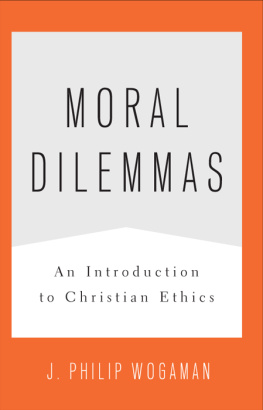

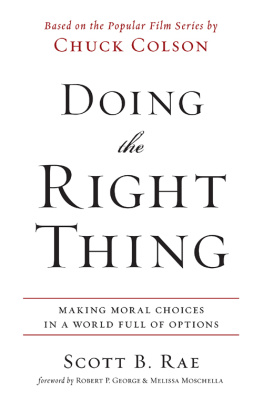
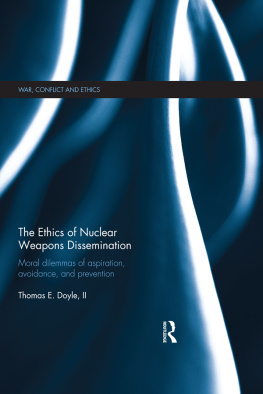
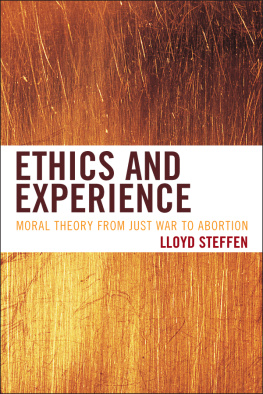
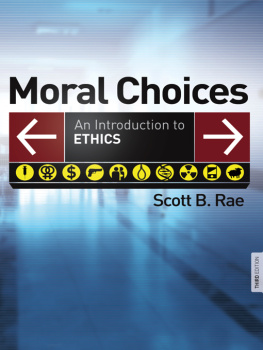
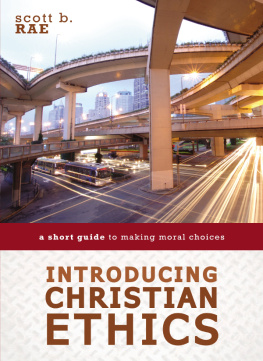
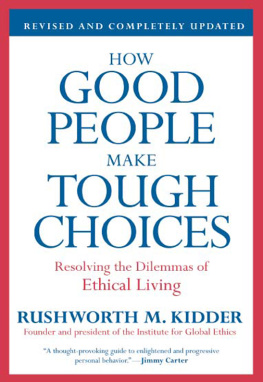
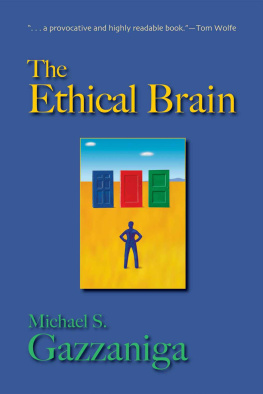

 The paper used in this publication meets the minimum requirements of the American National Standard for Information SciencesPermanence of Paper for Printed Library Materials, ANSI Z39.48-1992.
The paper used in this publication meets the minimum requirements of the American National Standard for Information SciencesPermanence of Paper for Printed Library Materials, ANSI Z39.48-1992.